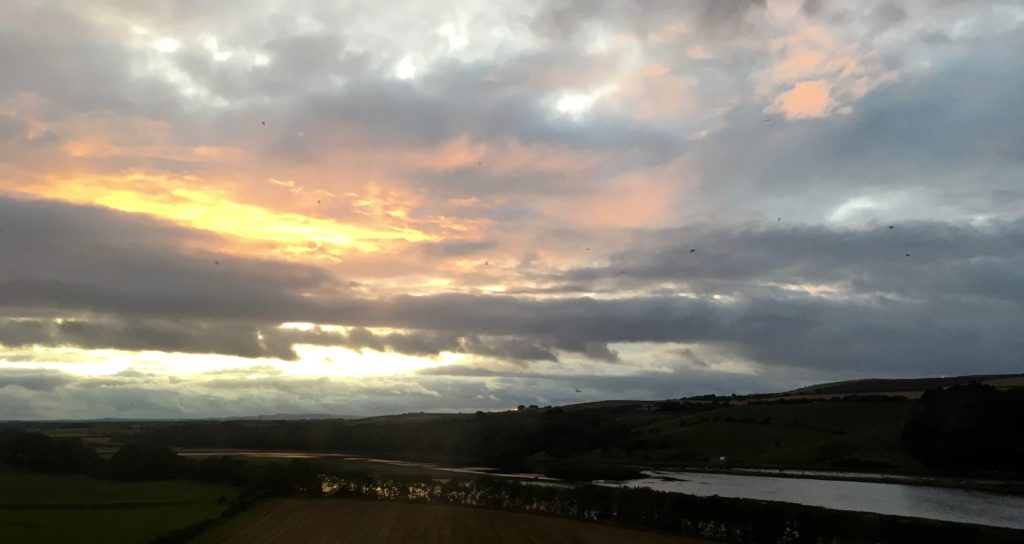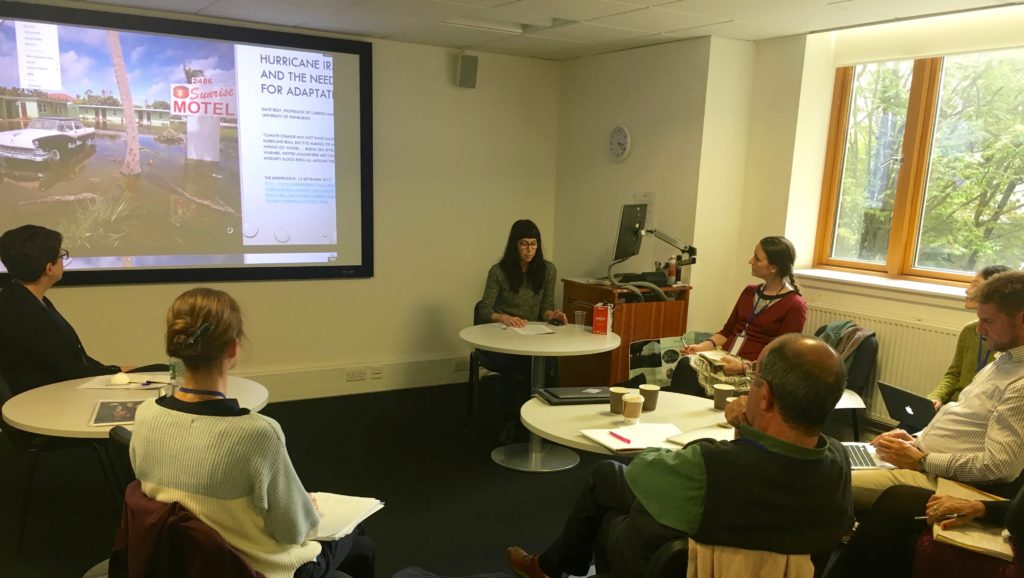
Two weeks ago I attended a workshop, ‘Bringing Climate Change Home: Researching Weathered Society’. The event was organised by Heid Jerstad, an anthropologist and postdoctoral fellow with the Global Environment and Society Academy at the University of Edinburgh. I made contact with Heid some months ago via her online hub Weather Matters which facilitates conversations between scholars of climate change and encourages liaisons across disciplinary and institutional boundaries. The workshop was framed around certain questions: What do we need to do to make weather changes comprehensible? How do we focus our research knowledge on tangible pathways to find insights and solutions? How do we make our critiques matter, and ensure that the right people hear them?
Three key themes were used to organise the presentations: materials, rhythms and knowledge. Diverse topics were covered by scholars and practitioners from different institutions and disciplinary backgrounds. To start the morning, Michael Bonaventura gave an overview of Museums of the Future Now, a collaborative project using an unconventional methodological approach based on futures thinking and participatory practice. Ruth Wolstenholme described her work with Sniffer using forms of multi-stakeholder engagement to understand the impacts of environmental change, including work with urban communities in north Glasgow. Both projects have involved artists and cultural practitioners to engage with communities in novel and creative ways.
The next session was more anthropological in nature with presentations on vernacular notions of change by Elena Burgos-Martinez and Tibetan understandings of weather and temporality by Su Hu. I presented some preliminary research, based on recent fieldwork in south Chennai, which seeks to explore changing relationships with weather and environment by tracing how monsoon rhythms are registered and experienced in the urban landscape. The resulting discussions focused on conceptions of place, time, processes of change and issues of translatability when working with vernacular epistemologies.
During the afternoon, we focused on the theme of knowledge with a presentation on ‘Upstream Engagement with Climate Science’ by George Adamson, work by Patricia Pinho looking at ‘Ecosystem Services, Wellbeing and Climate Change in Brazilian hotspots’, and forthcoming work by Hannah Baxter attempting to understand how resilience works in Scotland. The day closed with Elizabeth Vander Meer from the Edinburgh University Estates Management team speaking about ‘Place-Making and Resilience for University campuses’.

Themes that arose from discussions included the benefits and challenges of crossing disciplinary boundaries, and the possibilities presented by ‘indisciplinarity’ if we are to destabilise dominant terminologies, tools and methods. Collaborative engagements with creative practitioners’ present fruitful opportunities for questioning the confines of academic practice. One of the participants described how working with artists enabled the identification of a shared point of departure with no pre-defined point of arrival, leading to a mode of working that allowed them to “keep the opportunity space open”.
Radical approaches unconstrained by disciplinary boundaries, associated methodologies and modes of thinking are necessary to grapple with the challenges that face us in the present and the future. However, such new modes of working also raise questions… How do we pursue open-ended, flexible research agendas whilst also developing the kinds of analytically rigorous arguments that are necessary for countering dominant logics? How do we undertake such work when the freedom and risk-taking inherent to such processes is often not supported or encouraged by the management frameworks, conventional methodologies and impact-oriented assessment criteria demanded by institutions and funding agencies? How do we work in open-ended ways within interdisciplinary assemblages but retain mutual clarity and coherence?
Many of the presenters conveyed experience and knowledge they had gained by living and working with people from different social backgrounds and parts of the world. A common finding was that people and communities often struggle to engage with the topic of climate change. Reasons for this are varied, for example, in Glasgow other socio-economic issues take precedence and in Nain Bajo people live with different perceptions of change which are not necessarily easy to articulate. Working with the notion of weather, as opposed to climate, offers a potentially productive way forward. The workshop demonstrated that researching weathered societies reveals tensions between proofing-against as opposed to living-with weather, the significance of differential experiences of extreme weather events, and the potentiality of using topics like food and wellbeing as points of departure for weather-related inquiry.
A shared challenge is how to convey, translate and represent the resulting knowledge to those in positions of power. For me, the presentations demonstrated the importance of place-based, everyday understandings rather than the generic, technical perspectives that so often form the basis of responses and ‘solutions’ to climate change. But how do we represent and demonstrate the relevance and significance of alternative knowledges when they are hard to translate into a common language or frame of reference? The workshop presented a safe and supportive space for people to discuss these issues, share their experiences and exchange ideas. Such spaces, and the networks they enable, are vital when undertaking critical social science work that aims to challenge dominant orthodoxies but which is often carried out in isolated or unsupportive environments and can be precarious and risky.
As I travelled home, I was left pondering over the use of certain terms during the course of the day, such as ‘ecosystem service’, ‘resilience’ and ‘adaptation’. There was an underlying mutual sense of frustration regarding how these terms are used and operationalised but, apart from discussions regarding contested notions of ‘community resilience’, we did not manage to explore these terms in more depth. This is possibly a topic for a future workshop. Questioning and critiquing such concepts, and associated frameworks, policies and interventions, is perhaps one of the most important contributions that social scientists can make to climate change debates; as well as advancing knowledge, techniques and ways of working that help to counter normative thinking and corresponding solutions. We will seek to engage with these issues further during the course of Monsoon Assemblages, in conversation with Weather Matters and others.
